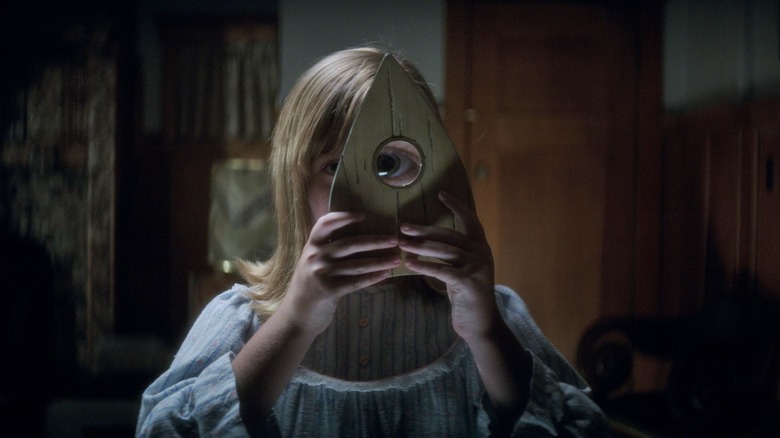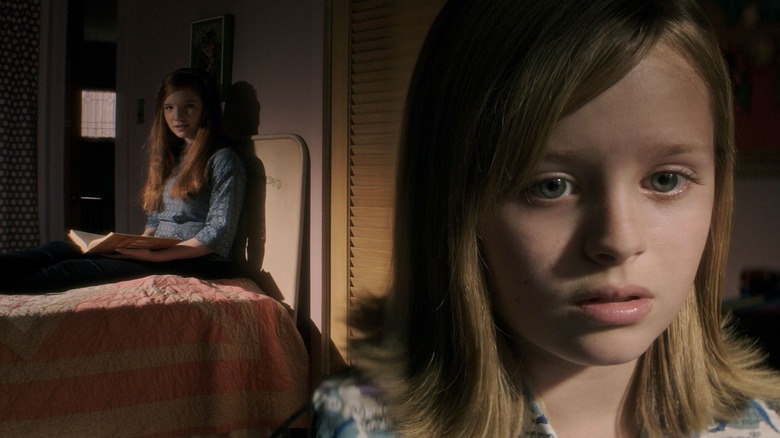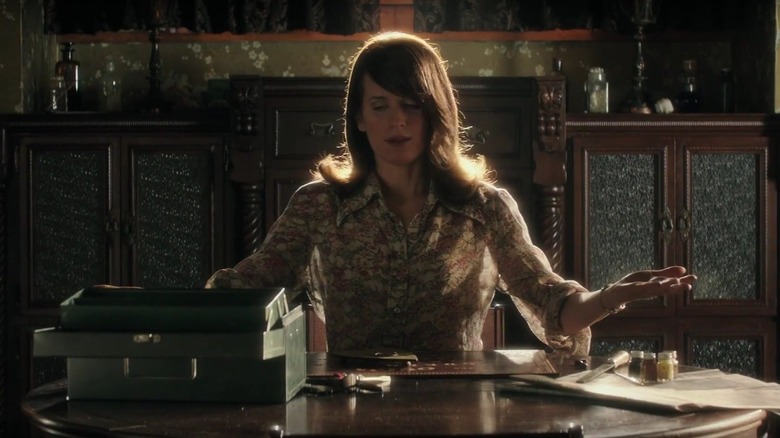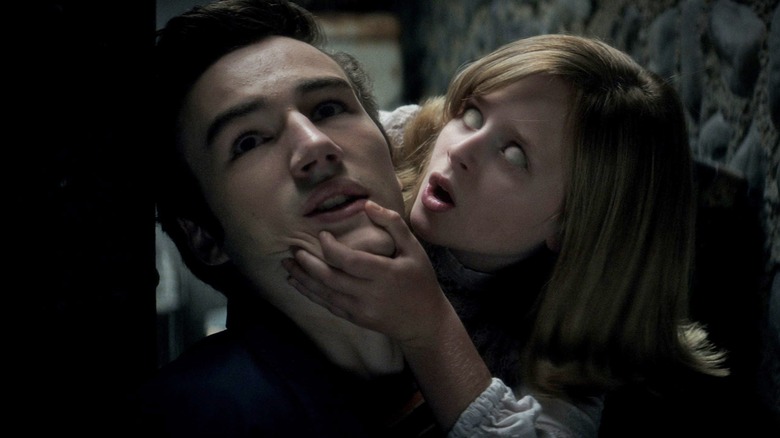Mike Flanagan Hated The Title Ouija: Origin Of Evil
Mike Flanagan is one of the most exciting names in horror right now, but his journey to getting there was a bit stop-and-go. He got his first taste of box office success with 2013's "Oculus," the filmmaker's well-received adaptation of his own short movie, "Oculus: Chapter 3 – The Man with the Plan." After that, Flanagan helmed three horror movies in rapid succession. Of the trio, one of them went directly to Netflix (the underrated home invasion thriller "Hush"), while another one of them spent several years floundering in limbo after its U.S. distributor, Relativity Media, declared bankruptcy ("Before I Wake").
The last of these three movies was 2016's "Ouija: Origin of Evil." For those who haven't seen it, "Origin of Evil" is a much better film than its risible subtitle would suggest. It's also vastly superior to 2014's "Ouija," a flash-in-the-pan Universal/Blumhouse hit that grossed more than 20 times its $5 million budget before joining the ranks of other since-forgotten awful PG-13 horror movies. Don't feel bad if you skipped seeing "Origin of Evil" in theaters assuming it was merely an attempt to squeeze more juice from an already dried-up orange. Its moniker didn't exactly dispel that notion, as Flanagan himself would tell you.
'I laughed out loud'
Contrary to early reports describing it as a sequel, "Ouija: Origin of Evil" is actually a prequel set in the late 1960s (nearly 50 years before the events of "Ouija"). Mike Flanagan really took the period setting to heart, too. In addition to opening the film with the crackly vintage logo that Universal Pictures used from 1963-1990, Flanagan told Esquire in 2016 that he and his frequent cinematographer, Michael Fimognari, filmed "Origin of Evil" with "antique lenses" and avoided modern technology like Steadicams. Instead, they limited themselves to techniques commonly employed in the '60s and early '70s, creating suspense with zooms and split-diopter shots (see the image above).
After going all-out to make "Origin of Evil" more than a creatively-bankrupt attempt to launch a "Ouija" franchise, you can imagine how Flanagan felt when he found out what Universal wanted to call it. He revealed how Blumhouse head Jason Blum broke the news to him in a post on his Tumblr:
I remember the phone call I got from Blum after the movie was done. Universal had decided that they wouldn't call the movie "Ouija 2" after all, they were worried about the number 2 making it feel less interesting. Instead, they'd taken a big swing: the movie would be called "Ouija: Origin of Evil."
I laughed out loud. I thought he was kidding. When it became obvious that he wasn't, I filed a protest. "It's not very good," I said. "It's cheesy. And not to put too fine a point on it, but the movie depicts neither the origin of the Ouija board, or of — um — Evil."
Blum's response? "Buddy, the title tested well. That's the way the cookie crumbles. Trust us, if the studio says it's 'Origin of Evil,' it's 'Origin of Evil.'"
Flanagan's biggest success
Despite having the same teen-friendly PG-13 rating and a much-improved critical reception, "Ouija: Origin of Evil" grossed significantly less than its predecessor. Mike Flanagan recalled in his Tumblr post:
"To everyone's surprise, the teenagers just... didn't really show up. The first movie had grossed 103 MILLION dollars worldwide, but our little prequel only managed to do about 80. It was considered a modest success, not a hit by any means, but no failure. In the end, Universal decided maybe there wasn't a franchise to be had here after all."
The biggest irony, as Flanagan pointed out, is that "Origin of Evil" remains his "most successful movie" to date, having grossed more at the box office than "Oculus," "Before I Sleep," or his criminally under-seen Stephen King adaptation "Doctor Sleep." The rest of his films "were all dumped to Netflix," Flanagan added.
It's a shame, really. Sans the post-credits scene connecting it directly to the first "Ouija" movie, "Origin of Evil" fully works as a standalone horror film. Its plot, which concerns a widow/fake spiritual medium who endangers her family by inadvertently conjuring a malicious spirit via Ouija board, is also a sincere examination of grief and loss, making it the thematic precursor to Flanagan's better-known and widely-celebrated work. Then there's the presence of actors like Elizabeth Reaser, Lulu Wilson, and Henry Thomas, all of whom have continued to collaborate with Flanagan on his projects since the movie came out. When you add all these elements together, it makes "Origin of Evil" feel like an oft-overlooked yet essential primer to the rest of the filmmaker's oeuvre.
A franchise cash-in done right
Despite its complicated legacy, Mike Flanagan and his crew's approach to "Ouija: Origin of Evil" worked wonders. "Origin of Evil" evokes genuine terror without R-rated levels of gore and violence, much in the same way as the horror films that directly inspired it, like "Poltergeist" and what Flanagan (correctly!) described to Esquire as the "awesome Disney horror movie" that is 1980's "The Watcher in the Woods." Thankfully, his disdain for the title aside, Flanagan doesn't regret directing the film. "I was making the second entry in a PG-13 franchise about an evil board game, and dammit if I didn't get to do everything I set out to do," he wrote in his Tumblr post, adding:
There's an exuberance to the camera movement, the staging, the set design, and the lighting. There's an unbridled joy in this movie, and I smile whenever I think about it. Up until this point in my career, every movie I had was hard-fought. "Oculus" was a trial by fire whose distribution deal was detonated days before it premiered. "Before I Wake" was a brutal experience both creatively and logistically. "Hush" was a labor of love and determination against all odds. But this one... man, this one reminded me why I wanted to make movies in the first place. Because it can be really, really f***ing fun.
It might be a franchise cash-in, but "Ouija: Origin of Evil" is a franchise cash-in done right and with actual passion, as evidenced by Flanagan's comments about the film all these years later.



